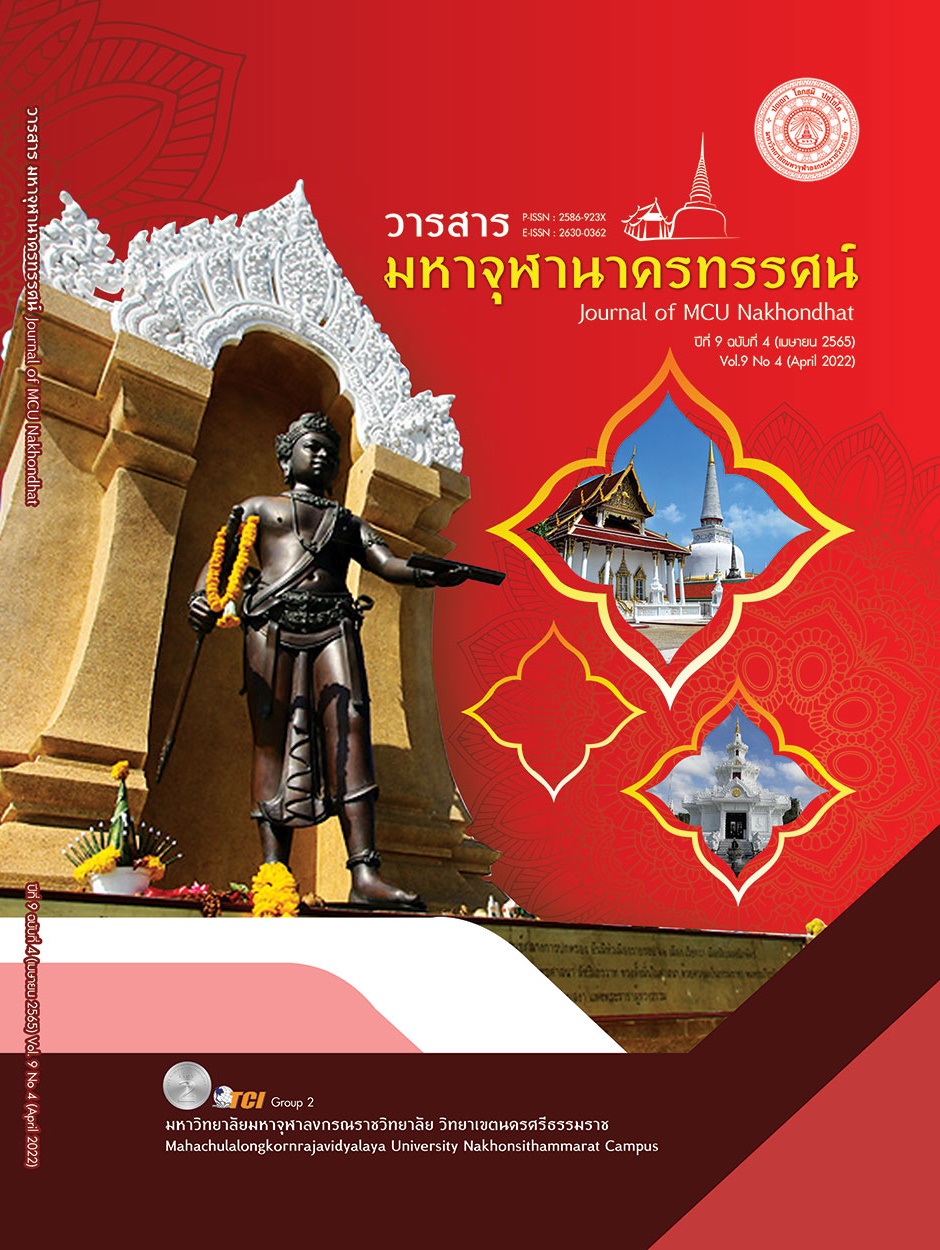THE PROBLEM OF PREVENTION OF FAMILY VIOLENCE IN PATHUM THANI PROVINCE: CASE STUDY DURING THE COVID-19
Main Article Content
Abstract
The objectives of this research article were to study the causes and conditions of family violence problems during the social distancing preventive measure the epidemic situation of COVID-19 in Pathum Thani Province and study the guidelines for the prevention of family violence problems. Using a qualitative research model. The key informant total 36 persons consisted of 15 violent perpetrators, 15 victims of violence, 2 social workers, 2 psychologists, and 2 police officers. The tools used for two interviews were the interviews form for perpetrators and victims of violence and interview forms for social workers, psychologists and police officers. The results showed that; due to the epidemic situation of COVID-19, the government has to put in place measures for everyone to stay at home to prevent infection and the outbreak of COVID-19. Usually, parents have to go to work, children was going to school will not be together for several days in row, and when everyone has to stay together for more than a month, it can affect family violence. The family violence during the COVID-19 epidemic is mostly caused by stress from family economic problems, jealousy, drunkenness. Violence is a quarrel between husband and wife, child abuse, and hurting the elderly who live with. Guidelines for preventing domestic violence problems; the relevant laws should be adjusted, to clear, integrate staff work processes enchancing the knowledge of fact finding, The people in the community need to help take care and report the incident. A family development center has been established in the community to provide assistance in the care of family violence.
Article Details

This work is licensed under a Creative Commons Attribution-NonCommercial-NoDerivatives 4.0 International License.
References
กรมกิจการสตรีและสถาบันครอบครัว. (2564). สถิติความรุนแรงในครอบครัวปีงบประมาณ 2564 (ต.ค.63-ก.พ.64). กรุงเทพมหานคร: กรมส่งเสริมสถาบันครอบครัว กรมกิจการสตรีและสถาบันครอบครัว.
กัณฐิกา พลอยทับทิม. (2560). การมีส่วนร่วมของศูนย์พัฒนาครอบครัวในการเฝ้าระวังความรุนแรงในครอบครัวจังหวัดปทุมธานี. วารสาร มจร สังคมศาสตร์ปริทรรศน์, 6(2) (พิเศษ), 37-51.
ขวัญฟ้า รังสิยานนท์. (2552). การพัฒนารูปแบบการจัดกระบวนการเรียนรู้แนวพุทธสำหรับเด็กปฐมวัย. ใน ดุษฎีนิพนธ์ปรัชญาดุษฎีบัณฑิต สาขาวิชาสังคมวิทยา. มหาวิทยาลัยรามคำแหง.
ชิตพล ชัยมะดัน. (2561). รูปแบบการป้องกันและแก้ไขปัญหาความรุนแรงในสังคมของชุมชนและองค์กรปกครองส่วนท้องถิ่นในจังหวัดสระแก้ว. วารสารวิชาการศิลปะศาสตร์ประยุกต์, 5(2), 30-38.
บุญเสริม หุตะแพทย์. (2545). ลักษณะการให้บริการของหน่วยงานภาครัฐและเอกชนที่เกี่ยวข้องกับปัญหาความรุนแรงในครอบครัว. นนทบุรี: มหาวิทยาลัย สุโขทัยธรรมาธิราช.
รัฐวิชญ์ อริยพัชญ์พล. (2563). การแก้ปัญหาความรุนแรงในครอบครัว. วารสารสังคมศาสตร์และมานุษยวิทยาเชิงพุทธ, 5(4), 21-335.
วนิดา อินทรอำนวย. (2563). กฎหมายว่าด้วยส่งเสริมการพัฒนาและคุ้มครองสถาบันครอบครัว. กรุงเทพมหานคร: สำนักงานเลขาธิการสภาผู้แทนราษฎร.
สำนักข่าวอิศรา. (2564). วิกฤติโควิด ปัจจัยเสี่ยงความรุนแรงในครอบครัว ทำสถิติปี 64 พุ่งกว่า 1.4 พันราย. เรียกใช้เมื่อ 8 กันยายน 2564 จาก https://www.isranews.org/article /isranews-scoop/99838-isranews-v.html
สุพัตรา สุภาพ. (2545). สังคมและวัฒนธรรม. (พิมพ์ครั้งที่ 5). กรุงเทพมหานคร: จุฬาลงกรณ์มหาวิทยาลัย.
อาภรณ์ เสียงแหลม. (2555). การสังเคราะห์งานวิจัยเกี่ยวกับปัจจัยที่เกี่ยวข้องกับการเกิดปัญหาความรุนแรงในครอบครัวต่อสตรีในสังคมไทย. วารสารการพยาบาลจิตเวชและสุขภาพจิต, 25(3), 38-55.
อารีวรรณ จตุทอง. (2563). ปัญหาความรุนแรงครอบครัวภัยเงียบในวิกฤตโรคโควิด-19. กรุงเทพมหานคร: สำนักงานคณะกรรมการสิทธิมนุษยชนแห่งชาติ.
อุษณี กังวารจิตต์. (2563). หวั่นช่วงหยุดอยู่บ้านต้านโควิด สถิติความรุนแรงในครอบครัวไทยอาจพุ่ง. ประชาชาติธุรกิจ. เรียกใช้เมื่อ 5 เมษายน 2563 จาก https://www. prachachat.net/general/news-444654
Broom, L., & P. Selznick. (1969). Sociology. New York: Harper & Row.
UN Women. (2020). COVID-19 and ending violence against women and girls. New York: UN Women.


